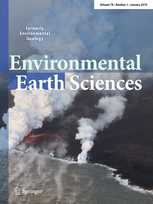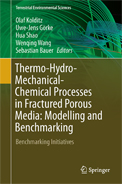DECOVALEX

Project title: Development of coupled models and their validation against experiments
Short project description:The international collaborative project DECOVALEX is one of the most successful long-term projects dealing with the development and validation of thermo-hydro-mechanical-chemical (THMC) models and numerical codes. For that purpose, laboratory and field experiments are employed for a better process understanding in geological and geotechnical materials along with their interactions in deep geological repositories for radioactive waste. Starting from 1992, DECOVALEX is in its 7th phase now. With the support of the Federal Institute for Geosciences and Natural Resources (BGR) the OGS teams has contributed successfully in the last phases to the following tasks:
DECOVALEX-2015:
- Task A: The SEALEX Experiment - HM processes in bentonite-based sealing structures
- Task B1: THM processes in bentonite buffers and argillaceous host rocks
- Task B2: The Horonobe EBS experiment - THMC processes in buffer, backfill and hostrock
- Task C1: THMC processes in single fractures of novaculite (micro-crystalline quartz) and granite
- Task C2: The Bedrichov Tunnel - hydro-chemical interactions in a fractured crystalline rock
DECOVALEX-2019
- Task A: ENGINEER: modelling gas injection experiment through compacted bentonite,
- Task B: FS: modelling the induced slip of a fault in argillaceous rock in the Switzerland,
- Task E: Upscaling of modelling results from small scale to one-to-one scale, heater tests from French underground laboratory Bure,
- Task F: FINITO: Fluid inclusion and movement in tight rock based on the observation data from underground facilities.
Project duration: since 1992 (current phase DECOVALEX-2019: 2016-2019, next phase DECOVALEX-2023 in preparation)
Funding organisation: BGR is funding the UFZ participation in DECOVALEX
The research for this project is being conducted in close cooperation with the Chair of Soil Mechanics and Foundation Engineering at the TU Bergakademie Freiberg.
At the Department of Environmental Informatics, research for this project is being conducted at the workgroup Computational Energy Systems and Geothermal Systems Analysis.
Project website: www.decovalex.org
This research was also part of the OpenGeoSys initiative (http://www.opengeosys.org/).

Further reading:
DECOVALEX 2015 Topical Collection in Environmental Earth Sciences
https://link.springer.com/journal/12665/topicalCollection/AC_4afd5d3151e292e32fb5583c8a0d4b9a/page/1
DECOVALEX introduction
https://www.springer.com/gp/book/9783319292236

